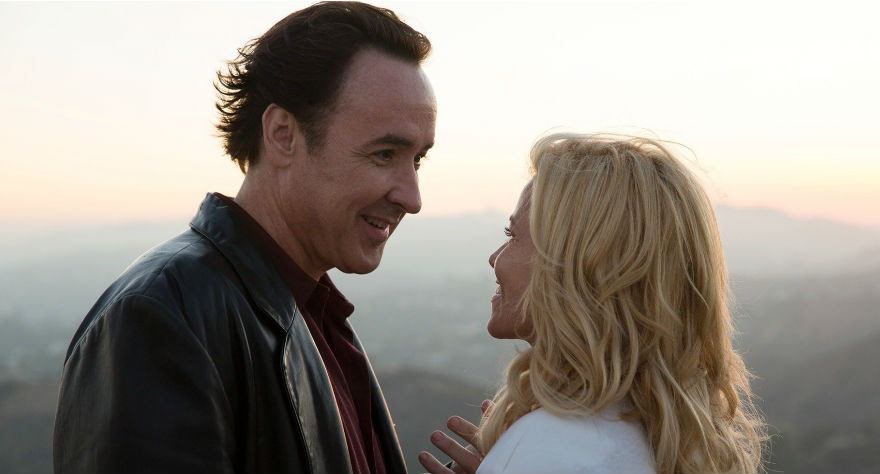
Pohlad's Brian Wilson biopic sidesteps cliché, telling a stereophonic story of heroes and villains.


Pohlad's Brian Wilson biopic sidesteps cliché, telling a stereophonic story of heroes and villains.

In a 2011 CBC Radio interview, Beach Boys frontman Brian Wilson was asked why the sun was such a central theme in his famous pocket symphonies. His answer: “Because it’s California sunshine, you know?” (He then proceeded to sing an impromptu, acapella version of “Do It Again.”) It was a delightfully straightforward, almost childlike answer given by a man who wrote heavenly songs to bat away the demons that terrorized and ravaged him in his waking life.
Love & Mercy, an unconventional biopic based on Wilson, isn’t so much about sunshine as it is about his demons. The focus is the anguish and isolation that plagued him from his early days as a musical prodigy and deep into his adult years, when drugs and anxiety nearly reduced his mind to mush. It may be the best musician portrait of the millennium so far, for its artistic ambition, supreme sound design and chilling performances.
It’s a hard enough thing telling someone’s life story in two measly hours, but when your subject is Wilson, a man whose life is so legendary it could easily fill a 1,000-page book, the Wikipedia biopic approach simply won’t cut it. Bad biopics try to shove a life story into a bottle; good ones take on a life of their own. Director Bill Pohlad and screenwriter Oren Moverman get it: instead of going with the “rock ‘n’ roll rise ‘n’ fall” approach, they use two critical, defining slices of Wilson’s life to render a beautifully complex, abstract interpretation of the man who gifted us “Good Vibrations” and “California Girls.” Despite covering only two portions of Wilson’s life, Pohlad and Moverman’s film feels rounded, complete, and faithful to its subject’s soul and spirit.
The narrative is stereophonic, in a way. It tells two stories, phasing them into a larger arc with clever scene arrangement and seamless editing that echoes the fluidity of Boyhood‘s invisible time jumps. Paul Dano plays a young Brian in the ’60s, whose artistic awakening has coincided with the emergence of a debilitating anxiety disorder; John Cusack plays him in the ’80s, a chemically imbalanced mess who’s unsure of every word that escapes his lips.
’80s Brian is a man on a leash, held captive by Dr. Eugene Landy (Paul Giamatti), a shady therapist who’s taken charge of Brian’s life and, conveniently, his funds. (Landy’s moved into Brian’s Malibu mansion, moving Brian to a smaller house up the coast.) Brian meets his savior and future wife in Melinda Ledbetter (Elizabeth Banks), a savvy car saleswoman who he asks on a date while sitting in a car she’s in the process of selling him. Melinda and Brian’s romance and camaraderie and her efforts to liberate him from the imperious Dr. Landy drive their half of the film.
The earlier time frame covers the Beach Boys in their prime, topping the charts and competing for pop culture dominance with The Beatles. An early scene has the camera slowly circling Dano’s Brian, sitting at a piano and playing a kernel of a song that, as the movie progresses, turns into “God Only Knows,” which would become widely regarded as one of the best songs ever written. His gift comes with a curse: severe panic attacks begin to wreak havoc on his psyche, torturing him as he creates Pet Sounds, an album that would become his preeminent masterpiece.

Wilson led a turbulent life from the start, going from being the son of an emotionally and physically abusive father and straight into the arms of Dr. Landy. He didn’t live life on his terms, instead resigning himself to the role of peon for most of his adult life. The only time he had absolute control was in the studio, where he was notoriously meticulous about the execution of his musical arrangements. Pohlad recreates the famous Pet Sounds sessions in brilliant detail, in the same studio where Wilson and The Wrecking Crew laid down the classic record. Dano gets Wilson’s obsessive perfectionism down, well, perfectly, vocalizing to the musicians exactly how he wants each note played. He yells to the cello player from the booth: “Taka-ta-taka-ta-taka-ta-taka!”
Love & Mercy glides forward gracefully, flitting from side to side between the two time periods like a well handled hockey puck. Its shape doesn’t resemble any biopic I’ve ever seen, and that’s its strongest quality. It jumps forwards and backwards in time, but the story’s movement feels lateral, not linear. The way Pohlad accomplishes this is by letting the two stories breathe and develop on their own terms and on their own time, apart from each other. They’re weaved together with sharp filmmaking technique, but beyond that they’re completely discrete.
The most glaring proof of this is the fact that Dano and Cusack look nothing alike. Their interpretations of Wilson are unique, and there doesn’t seem to be any sense of continuity between their performances. This is a good thing. If they’d used makeup to make them look more alike, it would have soured the pot from the get-go.
Looper comes to mind: What sold Joseph Gordon-Levitt as a younger Bruce Willis wasn’t the creepy-looking makeup; it was his performance. It was the twitches, the way he spoke, the way he walked, the way he held his hands, the way he raised his eyebrow. Cusack looks nothing like Dano or Wilson, but when he’s in motion—dangling his arms at his sides, whispering like a child with a secret—he sounds and moves and feels just like Wilson. He had a steeper hill to climb than Dano (who’s a dead-ringer for a young Wilson in every way), but he makes it to the other side without the aid of prosthetics or CG tomfoolery. Impressive.
This is the most subtle, measured performance of Dano’s career. He’s always been a standout, but always seems to be aggressively trying to steal scenes in an almost competitive, selfish manner that occasionally undermines his on-screen partners (he does this in Looper to Gordon-Levitt, actually). The fact that he’s playing such an iconic man (who happens to still be alive) in this movie seems to have calmed him down a bit and allowed him to explore nuance in a way he never has before. As a bonus, he plays the piano and sings himself, an extra detail musicians will no doubt appreciate. (Nothing’s worse than the disconnect of hearing a lovely piano tune as an actor flails his fingers across the keys like a faulty marionette.
(Cue “Heroes and Villains.”) Banks and Giamatti’s contributions to the film shouldn’t be understated. They’re both phenomenal, and in fact share a handful of scenes together, one of which may be the film’s best. In the throes of a nasty legal battle (Landy was Wilson’s legal guardian for a time), Dr. Landy pays Melinda a visit at the car dealership, pounding on her locked office door like a threatened gorilla, screaming obscene threats. Eventually, Melinda swings the door open. The look on Banks’ face as she stares down Giamatti is more badass than anything you’ll see in any action blockbuster this summer. She’s killer.
Wilson devotees will likely be moved to tears by Love & Mercy (“God Only Knows” is waterworks material for me no matter the context), thought the experience of the uninitiated will be no less special. This man is a certified American icon, and for his legacy to be preserved in a way that comes ever so close to matching his artistry is a wonderful thing. The film’s only major obstacle is Cusack’s resemblance issue. If you can’t get past it, you may find yourself repeatedly thrown out of the movie every time he saunters into frame. If you can get past it (it took me a while, but I did), you’ll have a film experience to treasure for years to come.